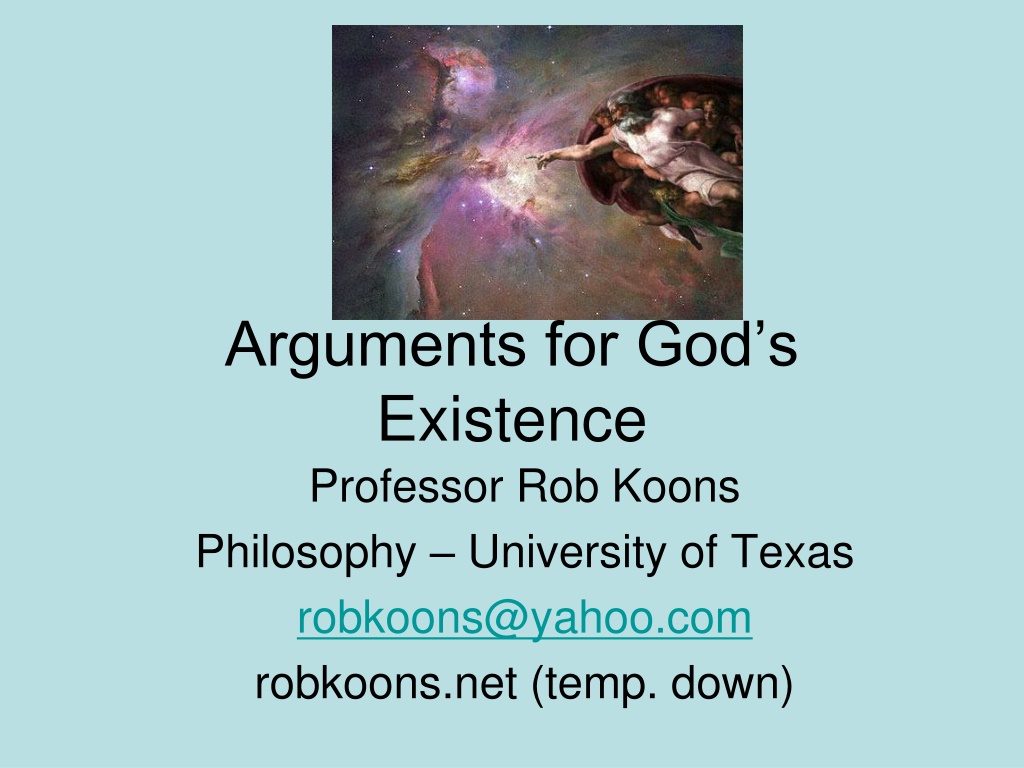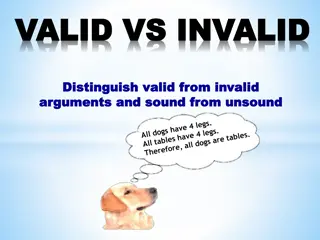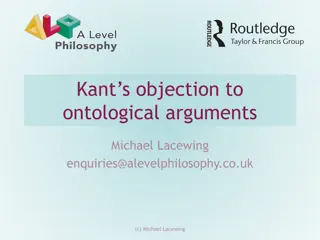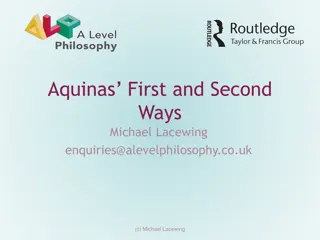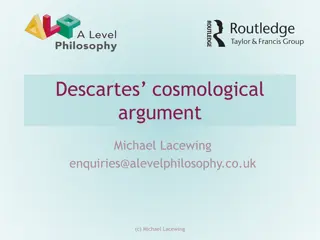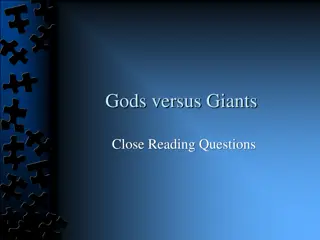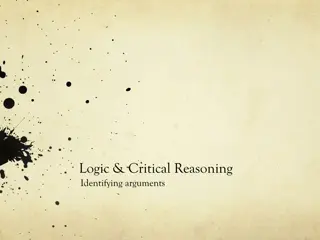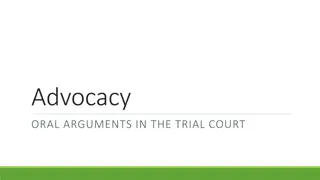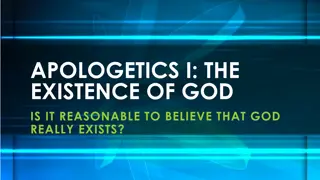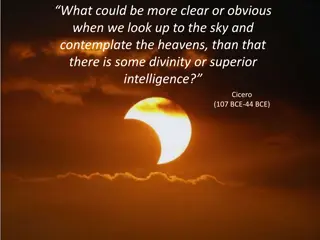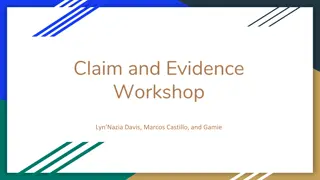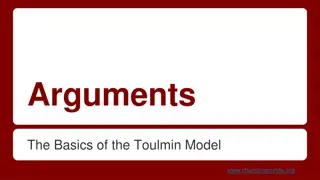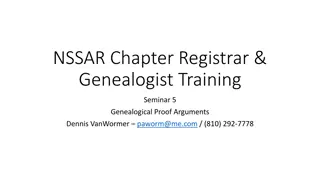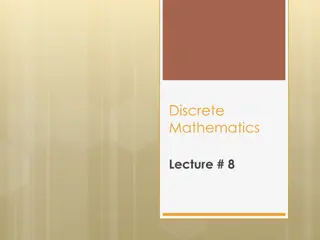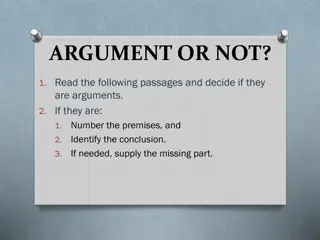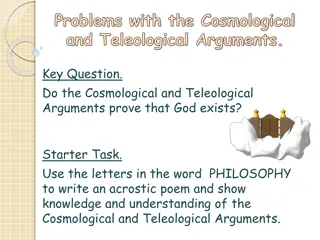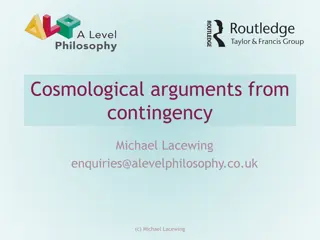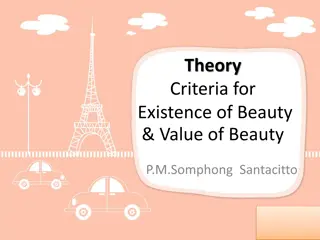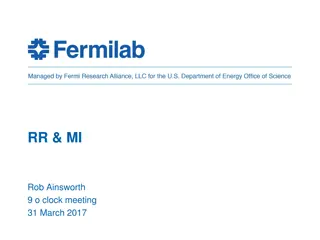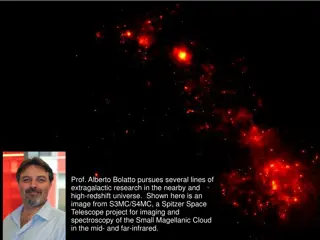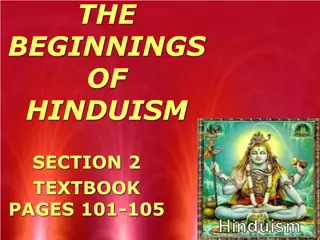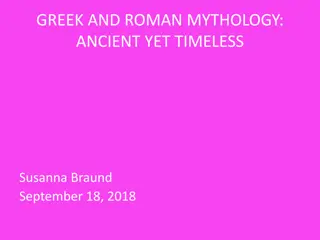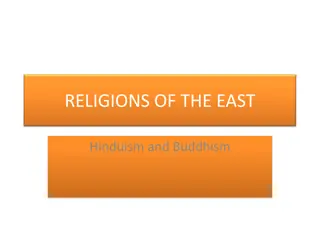Arguments for God's Existence - Prof. Rob Koons' Insights
Explore philosophical and scientific arguments for the existence of God presented by Professor Rob Koons from the University of Texas. The discussion covers the Thomistic argument, the Kalaam argument, and evidence supporting a supernatural cause for the universe, along with references to works by other scholars.
Uploaded on Oct 02, 2024 | 0 Views
Download Presentation

Please find below an Image/Link to download the presentation.
The content on the website is provided AS IS for your information and personal use only. It may not be sold, licensed, or shared on other websites without obtaining consent from the author. Download presentation by click this link. If you encounter any issues during the download, it is possible that the publisher has removed the file from their server.
E N D
Presentation Transcript
Arguments for Gods Existence Professor Rob Koons Philosophy University of Texas robkoons@yahoo.com robkoons.net (temp. down)
Evidence that the Universe (Space, Time and Matter) had a Supernatural Cause Philosophical arguments The Thomistic argument: whatever is contingent has a causal explanation. The Kalaam argument: time had a beginning. Scientific evidence: Evidence for the Big Bang Evidence for the fine-tuning of our universe for life
Proving Gods Existence What follows will be based on Ways 1-3 of St. Thomas Aquinas s Summa Theologica I 2 a3, and his much longer Summa Contra Gentiles: http://www.newadvent.org/summa http://www2.nd.edu/Departments/Maritain/etext/gc.htm By Alexander Pruss, at Baylor: The Principle of Sufficient Reason (Cambridge Univ. Press, 2010). Pruss and Rasmussen, Necessary Existence (2018) Also, some of my own work, including A New Kalam Argument , No s 2013, and (with Pruss), The Principle of Sufficient Reason and Skepticism, Philosophical Studies 2020.
An Argument with a Long History Accepted by philosophers from six great traditions: Ancient pagan (Greek and Roman) Jewish Christian Moslem Indian (10thcentury Nyaya school) Early modern European Developed over 2500 years.
What do we know? Hold out your right hand, and spread out your fingers. Do you know that there is a hand with five fingers in front of you? If so, you can also know that God exists
Empirical Knowledge Your knowledge of your hand and its fingers is a case of empirical knowledge : Things we know by observation (using the five senses) Things we know by memory (remembering what we have observed) Things we know by the testimony of others Things we can infer from these by scientific or historical reasoning
Empirical Knowledge Depends on Causality (Cause and Effect) When we know something empirically, our belief is linked by a chain of cause and effect to the thing we know. Sensory perception involves a chain of cause and effect (e.g., light reflection, retinal stimulation) Memory involves a chain of causes in the brain, recording and recalling a memory trace Testimony is passed down a chain of communication events Scientific and historical reasoning infers causes from effects or effects from causes.
Causal Chain If any of these steps could occur without a cause, knowledge would be impossible.
Does everything have a cause? Everything involved as a link in the chain of empirical knowledge must have a cause. Suppose, for example, that sensations could occur without any cause whatsoever. If that were ever possible, it would be possible all the time, and with a completely unpredictable and inscrutable probability. We would have good reason to think that we might be Boltzmann brains right now with nothing but illusory sensations.
Universal Causality must be Self-Evident We supposed that we did have some empirical knowledge (remember the five fingers). But such knowledge is impossible unless we know that every step involved (before the last one) necessarily has a cause. We can t know that empirically (without vicious circularity), so it must be a self- evident principle of reason.
The Only Possible Stopping Point There is one sort of thing that could fail to be caused, without threatening empirical knowledge: things that are obviously uncausable. Not just uncaused but self-evidently uncausable.
The Universal Causation Principle Let s say that something is natural just in case it isn t obviously uncausable. Reason tells us, with certainty: Every natural thing must have a cause.
Second Proof The Kalam Argument 1. The universe (the totality of things in time, things with causes) had a beginning. 2. Everything that had a beginning had a cause. Therefore, the universe as a whole had a cause.
Death to Fred! The Grim Reaper Jose Benardete s Infinity: An Essay in Metaphysics (1964)
Death to Fred! Death to Fred! 12:01 12:00:30 12:00:15 12:00:07.5 12:00:03.75 12:00:01.875
The Unbounded Version 1 B.C.: GR #1 2 B.C: GR #2 3 B.C.: GR #3 etc. Each Grim Reaper issues a death warrant for Fred if and only if no preceding GR has done so. (Invented by Prof. Pruss at Baylor, 2009.)
Story leads to a Contradiction At least one GR has initiated a death warrant, since otherwise all would have failed to do their duty. Say it was GR #n GR #n would have acted only if all earlier GR s did not act. So, both GR #(n+1) and GR#(n+2) did not act. But, if GR#(n+2) and all earlier GRs did not act, then GR#(n+1) would have acted. Contradiction.
Reductio ad Absurdum If a contradiction follows logically from a proposition, then that proposition must be false. The GR story follows from the proposition that an infinite regress is possible, and the GR story is self-contradictory. Therefore, an infinite causal regress must be impossible.
Another argument for a First Cause Even if infinite regresses were possible, they would have to have a cause as well. The Gale- Pruss cannonball argument. Let the Cosmos = the sum of all natural (variable, contingent) facts. The Cosmos will itself be contingent, so it comes under the Principle of Causation. The cause of the Cosmos must be separate from it and so must be infinite and necessary. (This argument is from al-Farabi, Duns Scotus, and Gottfried Leibniz)
Existence of a First Cause If the network of causation contains no loops and no infinite regresses, then there must exist at least one uncaused or First cause. However, we have seen that empirical knowledge requires that every evidentially proximate thing must be caused. So, any First Cause must be evidentially ultimate: obviously (self-evidently) incapable of being evidence for anything else, i.e., uncausable.
What must Ultimate things be like? What characterizes all causable things? (E.g., things we perceive or remember, things that are intermediate between perceptions and objects, things that can be used as scientific data) They are all (obviously) variable, inconstant, changing. So, an uncausable or ultimate thing (a First Cause) must be invariant, constant, unchangeable.
Nature of the First Cause Absolute Existence Uncausable Infinite
From First Cause to Absolute Being In order to be uncaused, the First Cause must be necessary (constant and invariant). In order to be necessary, the FC must be infinite in every respect, because what is finite is variable. In order to be necessary in itself, the FC must be simple or absolute Existence, since if it were not, it would be limited or bounded in some way, and so finite.
From Absolute Being to One God There could be only one thing that is identical to Absolute Existence, because if there were two, they d be identical to each other. This being must have all possible power, since it must be the cause of all possible beings. In order to have all possible power, it would have to possess all positive attributes to their absolute maximum degree: perfect knowledge, beauty, wisdom, goodness, etc.
The Big Bang A Belgian priest, Father Georges Lemaitre, was the first to discover that Einstein s theory of general relativity entailed that the universe had a beginning (1930 s). Fiercely resisted by most astronomers (as documented by Robert Jastrow s God and the Astronomers) for being too theological.
Proof of the Big Bang Astronomer Edwin Hubble observed the red shift of distant galaxies. Confirmed in the 1960 s with the observation of the cosmic background radiation , leftover from the Big Bang. Universally agreed upon: time, space and matter began 13.7 billion years ago. What begins to exist has a cause.
Before the Big Bang? In recent years, some physicists have proposed theories of a pre-Big-Bang era (infinite inflation or string/brane theories). 2003 theorem by Borde, Guth and Vilenkin: every inflationary model universe (with or without a multiverse) must have a beginning in time.
Design Argument We can infer that the First Cause is infinitely wise and personal by examining the creation. The creation is obviously organized for certain purposes: it obeys simple, universal laws, it permits the origin and development of life, it contains human beings, with the capacity for universal knowledge.
Evidence of Design: Overview Simple, elegant laws of nature. Anthropic fine-tuning. The constants of nature, the ratios of fundamental forces are adjusted to permit the formation of carbon, planets.
Evidence of Design The design of the earth, as an ideal environment for life, intelligence, astronomy: Guillermo Gonzalez, The Privileged Planet.
More evidence The origin of life (within a few million years of the formation of liquid water). The DNA code, that couldn t have formed by chance.
Some Anthropic Coincidences Seven coincidences (of about 40): #1: Strong nuclear force. If 5% weaker, no deuterium formed at Big Bang. Deuterium needed for initial ignition of fusion in stars. If 50% weaker, all elements would be unstable (equivalently, if electromagnetic force were 14X stronger)
Anthropic Coincidence #2 Cosmological constant must be close to zero (less than 10 to the minus 50th power), but positive. If too strong, inflation proceeds to far, leading to a diffuse cloud. If too weak, inflation cannot take place at all, leading to a lumpy, non-uniform cosmos, preventing the formation of stable stars and galaxies.
Anthropic Coincidence #3 Net electrical neutrality of universe. The number of protons and electrons (produced by two independent processes in Big Bang), must agree to within a factor of 10 to the 37th power. Otherwise, electrical repulsion would overwhelm gravity, preventing the formation of galaxies, stars, planets.
Anthropic Coincidence #4 The coordination of several atomic resonance levels in carbon. If the third resonance had been 1/2% higher, no carbon would have been produced. A common sense interpretation of the facts suggests that a superintellect has monkeyed with physics that there are no blind forces in nature. Astronomer Fred Hoyle
Anthropic Coincidence #5 Electromagnetic force (compared to gravity). If too weak, all stars would be short-lived blue dwarfs. Gravity is weaker by a factor of 10 to the 39th power. If gravity were 3000 times greater, no long-lived stars. 1 part in 10 to the 36th power.
Anthropic Coincidence #6 Visible light, 0.3 to 1.5 microns, (produced in abundance by Sun-like stars) has exactly the right energy levels to interact usefully with chemical reactions (almost all chemical reactions involve energy corresponding to the 0.32-0.8 micron range). Too little - passes right through matter (like radio and microwave). Too much -- destroys compounds (X-rays, gamma rays). Visible light is 1 part in 10 to the 25th power of the whole spectrum.
Anthropic Coincidence #7 The universe began in a state of extremely low entropy. Roger Penrose: odds of 1 in 10 to the 10 to the 123rd power. More zeros than there are atoms in the universe! If the Big Bang were merely a transition from some earlier state, then there would be no possible explanation for its low- entropy state.
The One-Two Punch To summarize tonight s lecture, we have a convergence of arguments for the conclusion that the universe has a supernatural cause: From metaphysics the First Cause arguments. From physics the Big Bang and fine tuning. The two together are much stronger than either separately. Physics makes God s existence probable, metaphysics makes it certain.
Best Scientific Evidence for God Is science itself! Every new scientific discovery confirms the existence of God.
Role of Christianity Without the faith in the rational intelligibility of the world and the divine vocation of human beings to master it, modern science would never have been possible: Alfred North Whitehead, Science and the Modern World, Joseph Needham, The Great Titration: Science and Society in East and West 41
Seven theological preconditions for science 1. The belief in the intelligibility of the universe, as the artifact of a perfect Mind, working with suitable material that it has created. The closely connected Hebraic conception of God as a law-giver. The idea of a law of nature was introduced by Christian theologian Basil of Caesarea (329-379), The Six Days. 42
Seven theological preconditions 2. A belief in the fitness of the human mind, created in the image of God, to the task of science, conceived of as a vocation given by God. 3. The need for observation and experiment to discover how in fact God has exercised His freedom and omnipotence in creating. 43
Seven theological preconditions 4. The disenchantment of the world by theism, clearing away the many gods of polytheism and animism. 5. The conception of nature as a divine book , parallel to the Bible. 44
Seven Theological Preconditions 6. The linear view of time. The possibility of progress. 7. The dignity of matter and of manual work, a consequence of the theological doctrine of the Incarnation (Jesus as God in human form), especially given Jesus occupation as a carpenter or stone cutter. 45
Alvin Plantinga Chapter 10 of Where the Conflict Really Lies (2011). Demonstrates that materialism, without a Designer who intended man to be equipped with an aptitude for truth, leads inexorably to a catastrophe, the defeat of all the materialist s aspirations for knowledge 47
The materialists quandary Lacking any explanation for his reliability, other than appeal to dumb luck, the materialist occupies a position that is untenable for the purposes of asserting claims to scientific knowledge. 48
Science vs. Materialism Materialism, therefore, can draw no support whatsoever from modern science, since scientific realism entails that materialism is false. If scientific theories are treated as mere useful fictions, science would have no bearing on the truth or falsity of materialism at all. 49
Science supports theism By contrast, theists can point to the success of science as the confirmation of their metaphysical position, the verification of a daring prediction made by theists hundreds of years ago. 50
